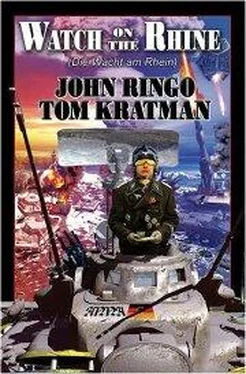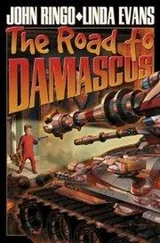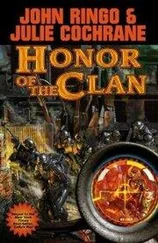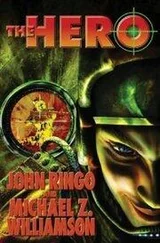“That does sound dire, Herr Kanzler . Five or ten thousand infantry divisions.”
The chancellor had done his time. He knew Mühlenkampf was miscalculating based on human norms for combat forces. The chancellor sighed. “No. They have no support forces to consider. One million of these beings — they are called ‘Posleen,’ by the way — means one million combatants. So no, not thirty or forty or even fifty infantry divisions per million. We are talking about the equivalent of about one hundred thousand infantry divisions, but infantry divisions from a warped scientist’s nightmares, dropping on our heads, all of our heads of course, over the next five years. And we have reason to believe, based on the way these beings act, that Europe’s share will be greater than that of any similarly sized area of the globe — say twenty percent, with the possible exception of what may hit the United States’”
Mühlenkampf considered, then objected, “But that is impossible, Herr Kanzler . No military force can organize like that. How would they feed themselves?”
The chancellor shuddered, remembering piles of small and gnawed bones in the snow. He shuddered and then found the impulse to enjoy giving the shock. “Why Mühlenkampf, they eat us , of course.”
Even the hardened SS general was taken aback by that grim news. “You are joking. You cannot possibly be serious. One hundred thousand infantry divisions, advanced over anything we have? Maybe twenty thousand of them against us? With complete dominance of air and space? And they will eat us, eat everyone, if we lose?”
“Not ‘if we lose,’ Mühlenkampf. When.”
Günter, so far quietly sitting at the chancellor’s side, began to raise an objection, before being hushed by the chancellor. “ ‘When,’ I said, Günter, and ‘when’ is what I meant. Nothing but that kind of desperation would make me put General Mühlenkampf back in uniform. Though I concede there are degrees of losing, some better than others.”
Turning back to the veteran, the chancellor continued, “We let ourselves go, Mühlenkampf. You knew the Communists had fallen?”
“I remember thinking, Kanzler , back when I still had some faculties for it, that although the Communists may have gone under I could no longer tell the difference between a Red Russian and a Green German.”
Günter, a committed Green and a Social Democrat bridled at that.
The chancellor’s party drew much of its support from the Greens. Even so, he had to admit, and would admit it only to himself, that there had once been little difference between the two, at least at the extremes of both movements. And yet…
“General, we Germans are packed into this country like rats. Do you want someone pissing in your drinking water? Well, every piss every German takes ends up there, you know. Do you want our children born deformed and retarded by the things industry dumps in our rivers, or would if we let them? Do you not think we need trees to make oxygen for us to breathe? And if you like to hunt, General, or to hike to enjoy the natural beauty of our country, do you not think those very animals and woodland scenes need a little protection?”
Mühlenkampf shrugged his indifference. “A political fanatic is dangerous no matter if he wants to hang capitalists or to gas Jews or to make economic life impossible, Herr Kanzler. ”
“I am no fanatic, SS man,” bridled Günter.
“Neither am I, bureaucrat,” answered Mühlenkampf, coolly. “I am a soldier and I rather doubt the chancellor brought me here to discuss politics. But to my mind a Red fanatic and a Green fanatic are indistinguishable. And Germany has had more than enough of both.”
Ah, well, I didn’t resurrect this man for his modern sensibilities, thought the chancellor. He continued, “Yes… well, be that as it may, after the Cold War ended we, all of us really, chopped our military forces to the bone. Let most of the rest be politicized, demoralized and castrated, too. Why, did you know, Mühlenkampf, that there is a law here now forbidding our soldiers from wearing their dress uniforms in public lest it upset certain types of Gästarbeitern . [4] Guest workers. Think Mexican fruit pickers but in a more regularized system. Many of them are Turks and Kurds. And yes, in 1997 the German legislature voted to ban soldiers from wearing their uniforms in public.
” The chancellor sighed with personal regret. Currying favor with the left at the time he, himself, had voted for that law.
“All of Germany, before this came up, could field, at most, seven mediocre divisions. Of these, one was almost entirely destroyed on another planet. Filling up that division’s losses, and expanding the remaining six upwards to about six hundred divisions, has proven impossible. We have the weapons; that or we soon will. We have the manpower… available at least. We do not have the trained cadre. We have called up and rejuvenated every combat veteran of the last war we could find except for you and people like you. And now…”
“And now,” Mühlenkampf continued, sensing the truth, “now you need us. ”
“Yes. Your country needs you. Your people need you. Your species needs you.”
“What will I have to work with?” asked the former SS man.
“We will fill you up with bodies, good ones, from among the young men we have. For your cadre there are enough, just enough, rejuvenated SS men to make a decent group for a large Korps , about five divisions plus support.”
Mühlenkampf thought immediately of a problem. “You wish to give us regular division numbers? The 413 th‘ Volksgrenadiers ’ or something on that order? Regular Bundeswehr uniforms?” The general shook his head, “ Herr Kanzler , that won’t work.”
“Why not?”
Mühlenkampf shrugged. “It is hard to explain, perhaps. But take me, for example. I was like Paul Hauser… or Felix Steiner, [5] Two exemplary former regular officers who entered into, and commanded large formations of the Waffen SS. Steiner is also notable for remaining a staunch and devout Roman Catholic.
for that matter. I was a regular first and joined the SS not out of any political convictions, but simply to be in an elite combat organization. And to fight, of course. I think few of the other ranks had very strong National Socialist political convictions, though some did. But one thing we all shared was a pride in the symbols for what they said about us as battle soldiers.”
Mühlenkampf sighed. “And then, of course, we lost the war. Rather badly, as a matter of fact. We went from the top of the heap to the despised of Germany, of the world. Our symbols became shit. People turned their faces away. Our wounded veterans were denied the pensions and care given to other branches of the Wehrmacht not one whit less guilty — whatever guilt means in such contexts as the Russian Front — than we were.
“We lost our pride.” The veteran finished, “And soldiers cannot fight without pride.”
This time Günter was not to be silenced. “Your Hakenkreutzer ? [6] Hooked Crosses, swastikas.
Your Sigrunen ?” [7] The silver dual lightning bolts of the SS.
he shouted. “Your Death’s Heads? Those symbols you will never be allowed to show.”
Mühlenkampf buffed fingernails nonchalantly against his left breast for some long moments. All the time he fixed the aide with a deadly stare. “Little man, do not try me. The SS told Himmler and Hitler — and they had the power to have us shot out of hand — to go fuck themselves so often, so many times, I have lost count. We fought the Russian hordes to a standstill across half a continent. We charged into American and British airpower and naval gunfire without demur… even without hope. When all was lost we were still fighting, because that is what we did. Never think, little man, not for an instant , that we can be intimidated by such as you ,” he ended, sneering.
Читать дальше











